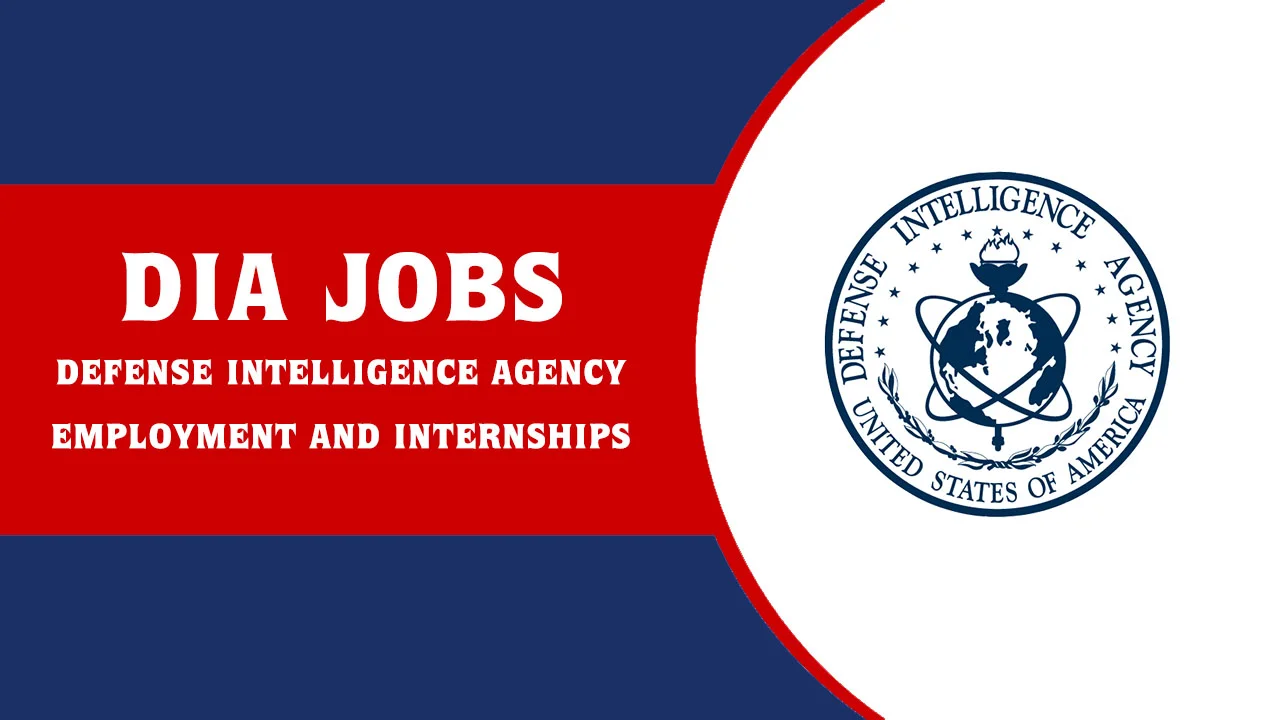Those who are passionate about safeguarding national interests through intelligence and strategy are often attracted to DIA jobs. The defence spying field can offer one of the most rewarding career paths for those wanting to contribute to espionage operations that protect the United States. Each position in this field contributes to supporting missions that extend across global territories. This includes engaging in complicated geopolitical developments, and gathering information that influences national security decisions.
Many job seekers eventually consider DIA careers after exploring a range of federal opportunities. The agency is known for recruiting professionals across several domains, which include cybersecurity, intelligence analysis, engineering, and logistics, among others. The positions attract individuals who are not only seeking a stable government career but also want to contribute to a system which helps protect and inform the nation. So don’t wait any longer and apply today!
For More Latest Aviation Jobs: Click Here
| Company Name: | DIA |
| Job Locations: | United States |
| Last Updated on: | August 15th, 2025 |
DIA Jobs with No Experience & Degree | Apply Now

Overview of the Defense Intelligence Agency (DIA)
The Defense Intelligence Agency stands as one of the key pillars of the United States’ national security and military espionage communities. It is a combat support agency under the Department of Defense that provides information to army commanders, policymakers, and defense-related decision-makers. Formed in 1961, the agency was established to consolidate armed forces intelligence efforts and provide a unified intelligence service for the Department of Defense. It is headquartered at Joint Base Anacostia-Bolling in Washington, D.C., where many of its primary operations are still coordinated.
The main purpose of this agency is to produce, analyze, and distribute intelligence on foreign militaries and operating environments, supporting both peacetime and combat missions. While the CIA focuses on more general state secrets, the DIA zeros in on military-focused data and battlefield information, making it incredibly valuable in wartime. Analysts, linguists, and technical experts work together to interpret current data from satellite surveillance, signal intercepts, and open-source information. The agency not only supports combat operations at present, but also works closely with other intelligence agencies and the United States Armed Forces.
Work Locations & Environment
The Defense Intelligence Agency operates from multiple locations across the United States and abroad. It gives employees the opportunity to work in secure, structured workplaces that often reflect military discipline while maintaining a civilian-friendly working environment. Most positions are housed in highly secure federal buildings equipped with modern technology and designed to support complicated intelligence workflows. Some of the major DIA offices include:
- Washington D.C., specifically at Joint Base Anacostia-Bolling, where the agency’s headquarters is based and many strategic operations are planned.
- Maryland, especially the Fort Meade area, is known for housing cybersecurity and intelligence collaboration centers.
- Florida, where tactical and regional missions are coordinated from various federal installations.
- Hawaii, supporting Pacific Command intelligence initiatives.
- Virginia, where additional analytical and support functions take place.
While many positions are based in these domestic offices, the agency also supports overseas assignments in Europe, the Middle East, and Asia. These roles allow individuals to work alongside partner intelligence agencies, support military operations, and provide field analysis in fast-changing geopolitical environments. These international posts are generally reserved for experienced professionals or those with specialized skills in field intelligence and regional expertise.
The work culture at DIA focuses on discipline and mission compatibility. It combines some features of a military environment with structured civilian responsibilities, which makes it ideal for those who appreciate routine, accuracy, and hierarchy. Employees are expected to be punctual, follow clearance protocols, and uphold the highest standards of confidentiality and honesty. While the work is serious, mentorship and collaboration are important elements of the daily operations, with experts guiding newcomers.
Many roles fall into hybrid work structures, balancing office-based responsibilities with fieldwork or remote assignments. Intelligence officers, for example, might spend a portion of their week conducting briefings or reviewing data at headquarters and then travel to partner facilities for joint operations or investigative follow-ups. This model allows for an accelerated career growth and meaningful contributions in both analytical and tactical roles.
Types of Jobs Available at DIA
There are a wide range of DIA jobs ranging from intelligence gathering to technical development to administrative support and global operations. These positions are designed to suit professionals from various educational and experiential backgrounds, from college graduates to experienced federal employees and military veterans. Each role plays a significant part in fulfilling the agency’s primary mission of delivering timely, reliable, and actionable intelligence to the nation’s defense leadership.
Intelligence Officers (Analysts, Human Intelligence, etc.)
The mission of the agency is carried out by intelligence officers. These roles involve collecting, evaluating, and interpreting information from a wide variety of sources to support defense planning and operations. Analysts often specialize in areas such as political affairs, military capabilities, terrorism threats, or regional conflicts. Human Intelligence officers, also known as HUMINT, are responsible for gathering information from human sources through interviews, interrogations, or diplomatic engagements. These positions require analytical thinking and an understanding of geopolitical contexts.
Cybersecurity & IT Roles
With the increasing reliance on digital platforms and the growing threat of cyber warfare, the agency employs an experienced team of cybersecurity professionals and IT specialists. These roles focus on protecting the agency’s networks, developing secure communication systems, and preventing cyber attacks. IT teams also build and manage the data infrastructure while ensuring immediate access to classified intelligence across the globe. Candidates for these positions usually hold degrees in computer science, cybersecurity, or engineering and must qualify for a high-level security clearance.
Language Experts & Translators
Language professionals are responsible for interpreting foreign communications, documents, and conversations that hold intelligence value. Translators and linguists work closely with intelligence analysts to decode messages and contextualize information in real time. These jobs demand fluency in high-priority languages such as Arabic, Russian, Mandarin, Farsi, and Korean, among others. Language experts may also be involved in transcription, cultural interpretation, and building linguistic profiles of foreign subjects.
Administrative & Support Staff
Every intelligence operation requires a strong administrative foundation. Administrative professionals manage schedules, documentation, logistics, and internal communications. They ensure that briefings, reports, and mission files are properly maintained and distributed. Support staff might also be involved in the management of human resources, facility management, finance, and regulatory compliance. These positions offer stability and well-organized working conditions while contributing directly to mission success.
Engineering & Scientific Roles
For those with a background in STEM, the agency provides opportunities in technical intelligence, materials analysis, weapon development tracking, and scientific threat assessments. Engineers and scientists help analyze foreign weapon systems, ballistic technologies, and research programs to predict adversary capabilities. These positions often interact with other intelligence units and require extensive technical training and top-level security clearances.
Contracting and Procurement Jobs
Behind every successful operation is a network of contracts, logistics, and strategic sourcing. Professionals in this field manage the acquisition of technology, supplies, and services essential to intelligence work. They negotiate with vendors, maintain accordance with federal procurement laws, and ensure necessary resources are delivered efficiently. Backgrounds in business, finance, or logistics are usually preferred for these positions.
DIA Internships & Student Opportunities
The Defense Intelligence Agency provides valuable entry points for students and fresh graduates through its internship and fellowship programs. These opportunities are designed to expose young professionals to the agency’s mission, tools, and culture while offering practical experience in intelligence work. Interns are often placed in analytical, technical, or administrative units where they can contribute meaningfully while learning how federal intelligence operates from the inside. Internships are paid competitively, and held during the summer, which gives students a chance to acquire federal service experience that can lead to long-term careers.
Eligibility for internship programs generally includes US citizenship, enrollment in an accredited college or university, and a minimum GPA threshold. Finalists must also pass a security clearance process, which includes background checks and possibly a polygraph. The agency also offers the DIA Undergraduate Training Assistance Program (UTAP) and the Defense Intelligence Postgraduate Scholarship Program (DIPSP), which help fund education in exchange for service commitments.
To stand out as an applicant, students should prepare a federal-style resume, show an interest in national security or international affairs, and maintain academic excellence. Application periods usually open months in advance, and spots are limited. Strong writing skills, discipline, and a genuine desire to serve the public are necessary qualities that the agency looks for in candidates. These programs can serve as a path toward permanent employment, which allows interns to return as full-time employees once they’ve completed their studies.
Salary Overview
The payscale for DIA jobs follows the General Schedule (GS) pay system, a standardized pay scale used across most US government agencies. Salaries are calculated based on grade, step level, and location, with opportunities for increased pay based on performance, promotion, and time served. The agency also offers locality pay adjustments and occasional bonuses depending on mission-critical needs or high-demand skills. Here’s how it breaks down:
- General Schedule (GS) Pay System: This system consists of 15 grades (GS-1 to GS-15), each with 10 incremental steps based on experience and time in service.
- Entry-Level Salary (GS-7 to GS-9): Most recent graduates or new federal entrants start in this range, earning between $40,000 and $60,000 annually.
- Mid- to Senior-Level Roles (GS-11 to GS-15): Experienced professionals in leadership or technical roles can earn between $70,000 and $140,000+.
- Locality Pay & Bonuses: Employees in high-cost areas like Washington D.C., Hawaii, or San Francisco receive additional compensation through locality pay. Merit-based bonuses may also be available for exceptional performance.
- Internship or Training Pay: Interns and trainees usually receive stipends or entry-level hourly rates aligned with the GS scale for student roles.
- Comparisons to Other Agencies: DIA compensation is similar to agencies like NSA or CIA, though mission-based incentives and overseas pay can differ slightly.
Benefits of Working at DIA
Employees at the Defense Intelligence Agency receive a full suite of federal benefits that enhance job satisfaction, promote wellness, and support long-term career development. These benefits are specifically designed to make the federal service more adaptable, especially in demanding fields like national security and defense intelligence. In addition to job stability and a competitive salary, the benefits include:
- Federal Health Insurance: Multiple plans available under the FEHB Program, covering medical, dental, and vision with optional family plans.
- Paid Vacation & Sick Leave: New employees begin with generous annual and sick leave accruals, which increase over time. All federal holidays are observed.
- Retirement & Pension Plans: The Federal Employees Retirement System (FERS) offers a pension, Social Security benefits, and access to the Thrift Savings Plan (TSP) with employer matching.
- Flexible Hours & Telework: While many positions are on-site due to clearance levels, some roles offer hybrid work or flexible schedules where applicable.
- Student Loan Repayment & Scholarships: Eligible employees can receive student loan assistance or funding through scholarships and training programs linked to organizational needs.
Eligibility Criteria
Before considering DIA jobs, it’s important to understand that the hiring process is different from most traditional applications. Due to the nature of national defense and intelligence work, candidates are expected to meet a strict set of criteria that goes beyond education and work experience. Every applicant is evaluated not only for their qualifications but also for their reliability, trustworthiness, and compatibility with the agency’s mission. These requirements are in place to ensure that every member of the workforce can be trusted with highly confidential and often classified information.
US Citizenship Requirement
To be eligible for employment with the agency, all candidates must be United States citizens. This is a non-negotiable condition under federal regulations that govern access to classified material. The agency handles information that is incredibly important to national security, so full citizenship is required to ensure allegiance and legal accountability. Dual citizens may apply, but their second citizenship can be a factor during the clearance process, especially if there are concerns about foreign influence or loyalty risks.
Age Requirement
Applicants must be at least 18 years old at the time of employment. This minimum age requirement ensures that these candidates are legal adults capable of undergoing the necessary federal background checks and clearance processes. While there is no upper age limit, certain positions may prefer candidates with several years of relevant experience or advanced education. Some internship opportunities may accept students under the age of 21, provided they meet academic and security standards.
Security Clearance Requirement
Most positions at the agency require a Top Secret clearance, and many also need Sensitive Compartmented Information (SCI) access. These clearance levels are absolutely necessary because employees regularly handle information that, if disclosed, could cause serious harm to national security. The clearance process includes an extensive background investigation that reviews personal history, associations, financial records, travel, and more. For certain roles, candidates may be asked to complete a polygraph examination to confirm truthfulness and ensure no security red flags exist.
Education and Qualifications
A bachelor’s degree from an accredited institution is the baseline requirement for most professional roles. Fields such as political science, international relations, cybersecurity, engineering, foreign languages, or intelligence studies are commonly sought after. Some technical or leadership positions may call for a master’s degree or a professional certification, depending on the nature of the work. For internships or entry-level analyst positions, high academic performance, relevant coursework, or prior federal internship experience are significant assets.
Background Checks and Polygraph Examinations
All applicants must successfully pass a federal background check. The process investigates an individual’s criminal history, credit standing, employment record, and personal associations. The purpose is to identify vulnerabilities that could potentially lead to coercion or compromised behavior. For positions that involve access to highly confidential information, candidates may also be subjected to a full-scope polygraph. This test helps verify the accuracy of information provided during the investigation and assesses suitability for the unique responsibilities of the position.
How to Apply for DIA Jobs?
Applying for DIA jobs begins by visiting the career portal through the “Apply Here” button below. Here, all current openings are posted. Applicants must first create an account or sign in if they already have one. From there, they can search for open positions, using filters such as job family, grade level, location, or posting date to narrow down the listings. Once a suitable position is found, candidates can submit their resume and any required documentation directly through the platform. After initial screening, selected candidates are contacted for interviews and then advanced to the security clearance phase. This includes a background check and possibly a polygraph. In some cases, the agency may also conduct a hiring event. Basically, this program serves as an accelerated recruitment channel where pre-screened applicants can engage with hiring managers directly.
Summary
While many federal agencies offer stable employment, DIA jobs stand out as one of the most impactful career paths for individuals who want to contribute to national security in a meaningful way. The agency offers an exceptional combination of generous pay, comprehensive benefits, and international exposure. Whether you’re an experienced professional or a recent graduate, the opportunity to serve alongside some of the country’s most skilled intelligence experts is within reach. Starting through the agency’s job site is the first step to discovering a position that matches your skills and your desire to serve something greater than yourself.
 Find Newest Jobs in USA
Find Newest Jobs in USA



